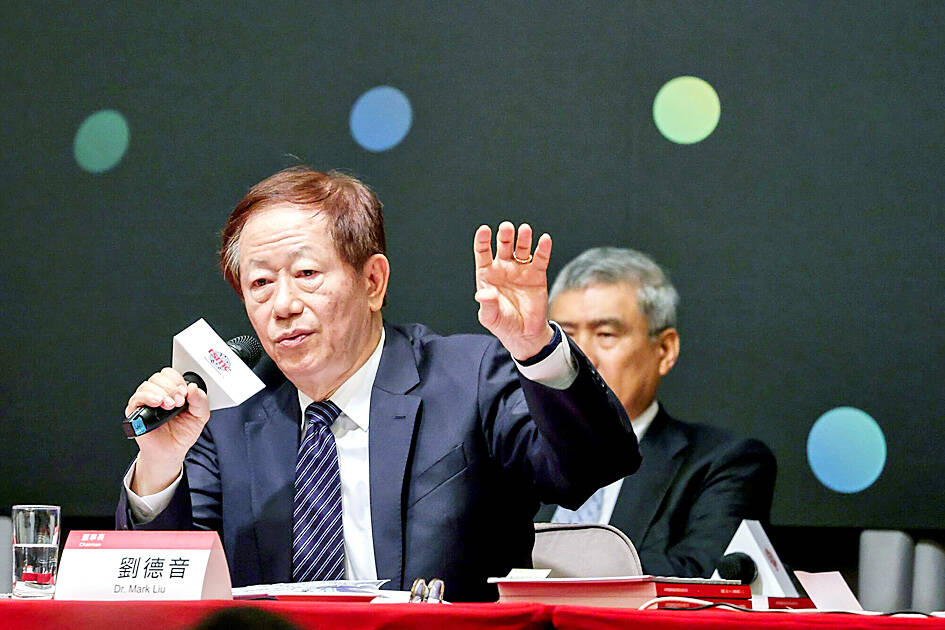Taiwan Semiconductor Manufacturing Co (TSMC, 台積電), the world’s biggest contract chipmaker, yesterday reported a second straight month of revenue growth to NT$176.54 billion (US$5.75 billion) last month, its best result since February.
Last month’s revenue expanded 19.4 percent from NT$147.9 billion in April, but was down 4.94 percent from NT$185.71 billion in May last year.
TSMC reported first-quarter revenue of NT$833.07 billion, down 1.9 percent from NT$849.34 billion in the same period last year.

Photo: Cheng I-hwa, Bloomberg
TSMC has said that it expects a drop of about 10 percent in revenue in the first half of this year from the same period last year, compared with an earlier estimate of a mid-to-high single-digit percentage fall.
The company attributed the changed outlook to longer-than-expected inventory digestion in its supply chains that is likely to extend into the third quarter.
It made NT$1.025 trillion in the first half of last year.
TSMC said it expects second-half revenue to be higher than the first half, benefiting from new product launches by customers.
There has been a pickup in demand, especially for generative artificial intelligence (AI) chips, propelling demand for high-end chip-on-wafer-on-substrate (CoWoS) technology, TSMC said on Tuesday.
That reinforced the company’s expectations that this quarter would be the bottom for its business.
TSMC on Thursday launched a new advanced packaging fab to support the next generation of chips for high-performance computing, AI, mobile applications and other products.
The new fab at the Jhunan Science Park (竹南科學園區) in Miaoli County is the chipmaker’s largest advanced chip packaging fab.
The fab would add capacity flexibility for its advanced packaging and silicon stacking technologies, such as small outline integrated circuits, integrated fan-out (InFO) and CoWoS, while improving advanced testing, production yield and efficiency, TSMC said.
Meanwhile, United Microelectronics Corp (UMC, 聯電), the world’s No. 3 contract chipmaker, reported a third consecutive month of revenue growth last month.
Revenue rose 1.7 percent to NT$18.78 billion from NT$18.46 billion in April, although it declined 23.14 percent from NT$24.43 billion in the same month last year.
In the first five months of this year, UMC revenue fell 17.35 percent to NT$91.45 billion from NT$110.66 billion in the same period last year.
The company said it has not seen strong signs of a significant recovery in the second half, which is usually the peak season for the electronics industry.
Gudeng Precision Industrial Co (家登精密), a key supplier of extreme ultraviolet (EUV) pods to TSMC, yesterday said revenue expanded 22.09 percent annually to NT$2.09 billion in the first five months, bucking the semiconductor industry’s downtrend.
Gudeng said its factory is fully utilized this quarter, thanks to robust demand.
Separately, Gudeng has lost a patent infringement lawsuit against bigger rival Entegris Inc.
Gudgeng in November 2021 filed a case accusing Entegris of illegally using its patents for its EUV and front-opening unified pod (FOUP)-related technologies.
Entegris, a supplier of advanced materials and process solutions for the semiconductor and other high-tech industries, said that the Intellectual Property and Commercial Court ruled in its favor.
The ruling reaffirms Entegris’ unwavering commitment to identifying and safeguarding valid third-party intellectual property rights, and it remains steadfast in protecting these rights whenever the need arises, Entegris said in a statement.

Zhang Yazhou was sitting in the passenger seat of her Tesla Model 3 when she said she heard her father’s panicked voice: The brakes do not work. Approaching a red light, her father swerved around two cars before plowing into a sport utility vehicle and a sedan, and crashing into a large concrete barrier. Stunned, Zhang gazed at the deflating airbag in front of her. She could never have imagined what was to come: Tesla Inc sued her for defamation for complaining publicly about the vehicles brakes — and won. A Chinese court ordered Zhang to pay more than US$23,000 in

Taiwan Semiconductor Manufacturing Co (TSMC, 台積電) yesterday said that its investment plan in Arizona is going according to schedule, following a local media report claiming that the company is planning to break ground on its third wafer fab in the US in June. In a statement, TSMC said it does not comment on market speculation, but that its investments in Arizona are proceeding well. TSMC is investing more than US$65 billion in Arizona to build three advanced wafer fabs. The first one has started production using the 4-nanometer (nm) process, while the second one would start mass production using the

A TAIWAN DEAL: TSMC is in early talks to fully operate Intel’s US semiconductor factories in a deal first raised by Trump officials, but Intel’s interest is uncertain Broadcom Inc has had informal talks with its advisers about making a bid for Intel Corp’s chip-design and marketing business, the Wall Street Journal reported, citing people familiar with the matter. Nothing has been submitted to Intel and Broadcom could decide not to pursue a deal, according to the Journal. Bloomberg News earlier reported that Taiwan Semiconductor Manufacturing Co (TSMC, 台積電) is in early talks for a controlling stake in Intel’s factories at the request of officials at US President Donald Trump’s administration, as the president looks to boost US manufacturing and maintain the country’s leadership in critical technologies. Trump officials raised the

From George Clooney to LeBron James, celebrities in the US have cashed in on tequila’s soaring popularity, but in Mexico, producers of the agave plant used to make the country’s most famous liquor are nursing a nasty hangover. Instead of bringing a long period of prosperity for farmers of the spiky succulent, the tequila boom has created a supply glut that sent agave prices slumping. Mexican tequila exports surged from 224 million liters in 2018 to a record 402 million last year, according to the Tequila Regulatory Council, which oversees qualification for the internationally recognized denomination of origin label. The US, Germany, Spain,